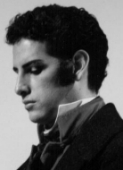
JUAN DIEGO FLÓREZ
A BRIEF BIOGRAPHY
by Jean Peccei
Juan Diego Flórez was born in Lima, Peru on January 13, 1973. He comes from a musical, albeit a non-operatic background - his father, Rubén Flórez, was a noted guitarist and singer of Peruvian folk and Creole music. Initially intending to pursue a career in popular music, he entered the Conservatorio Nacional de Música at the age of 17. His 'classical voice' emerged in the course of his studies there under Maestro Andrés Santa María. During this time, he became a member of the Coro Nacional of Peru and was soon singing as a soloist in works such as Mozart's Coronation Mass and Rossini's Le Petite Messe Solennelle.
He received a scholarship to the Curtis Institute in Philadelphia where he studied from 1993 to 1996 and began singing in student opera productions in the repertory which is still his specialty today, Rossini and the Bel Canto operas of Bellini and Donizetti. During this period, he also
studied with Marilyn Horne at the Santa Barbara Academy Summer School. In 1994, while on vacation in Peru, he met the eminent Peruvian tenor, Ernesto Palacio. Palacio invited him to Italy to work on a recording project (Il Tutore Burlato) and became his teacher and mentor. Flórez frequently acknowledges the profound influence which Ernesto Palacio (now also his manager) has had on both his vocal technique and on the course of his career.
Flórez's first big breakthrough (and professional debut) came at the age of 23 at the 1996 Rossini Opera Festival in Pesaro. Bruce Ford, the lead tenor in Matilde de Shabran had become ill - with no one else at the Festival who knew the fiendishly difficult role of Corradino. Florez, who was booked to sing a minor role in another opera at the Festival, agreed to learn Ford's part in the remaining two weeks before opening night. His performance as Corradino on August 13th caused a sensation, and he has never looked back. He made his debut at La Scala in the same year in Gluck's Armide. Flórez's Covent Garden debut followed a year later in a concert performance (and the first modern performance) of Donizetti's Elisabetta. With history somewhat repeating itself, he had once again stepped in for the ailing tenor (this time Giuseppe Sabbatini) at virtually the last minute. As Tim Ashley wrote in The Guardian,... "By the end of the evening it was clear that Elisabetta - an overlong, picaresque sprawl of an opera - was no rediscovered masterpiece; yet everyone was convinced that a great tenor had arrived. Flórez looked a little nervous on the platform, but the audience cheered him on as aria followed aria with staggering ease. The reviews were ecstatic."
Since then, Flórez has appeared in most of the great opera houses, including the Vienna Staatsoper and the New York Metropolitan Opera. He has been awarded the Premio Abbiati 2000 (awarded by Italian critics for the best singer of the year), the Rossini d'oro, the 2003 Tamagno Prize and the L'Opera award (Migliore Tenore) for his 2001 performance in La Sonnambula at La Scala, His first solo recording for Decca, a recital of Rossini arias was
received with universal acclaim, winning the 2003 Cannes Classical Award. His second recital cd - Un Furtiva Lagrima - likewise won the Cannes Classical Award the following year. Flórez's recordings of complete operas on the Decca and Deutsche Grammophon labels now include
Mitridate, Re di Ponto, Il barbiere di Siviglia, Le Comte Ory, La fille du regimént, and Matilde de Shabran.
Mitridate, Re di Ponto, Il barbiere di Siviglia, Le Comte Ory, La fille du regimént, and Matilde de Shabran.
On a personal note, the first time I heard Juan Diego Flórez was in Otello at the Royal Opera House, Covent Garden in January 2000. It was the most amazing reaction to a singer that I have ever seen, particularly in England where opera audiences have tended to be rather reserved. When he finished Rodrigo's aria, 'Che ascolto!' there was a moment of stunned silence, as if the audience could not believe what they had just heard. Then the house erupted in what I can only describe as a roar of delight. His subsequent recital at St. John's Smith Square, sealed my love affair with his voice. His technique is breath-taking, but he has much more than that. His voice is warm and virile with a sensuous quality that one doesn't often hear in Rossini tenors. Equally important is the sheer joy that he communicates when he sings - Juan Diego Flórez's performances are musical versions of the Tivoli Fountains.
See also:
Flórez's Discography
Flórez's Schedule of current and future performances
The Tivoli Fountains (Villa d'Este)
Index of Flórez Press Reviews
Index of Flórez Press Articles
Sources:
'Un peruano en la Scala de Milán' by Miguel Ángel Cárdenas.La República, 1 September 2002
'He'll take the high road' by Hugh Canning, The Sunday Times, November 11 2001
'He's got no strings' by Tim Ashley, The Guardian 14 March 2002
Entrevista, Cultura al Día (Perú), December 1999
Official Biography: www.ernestopalacio.com
This page was last updated on: December 17, 2006